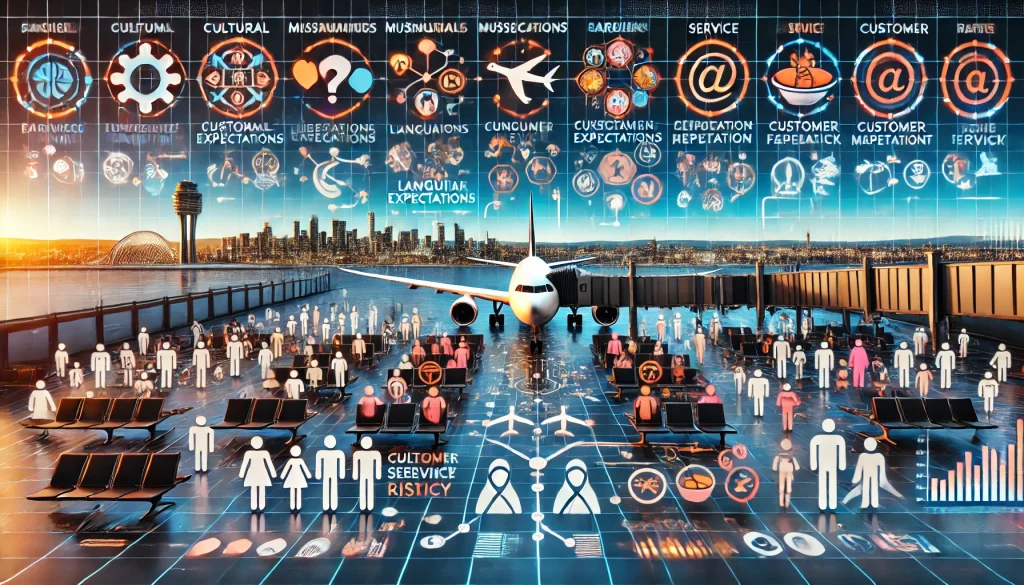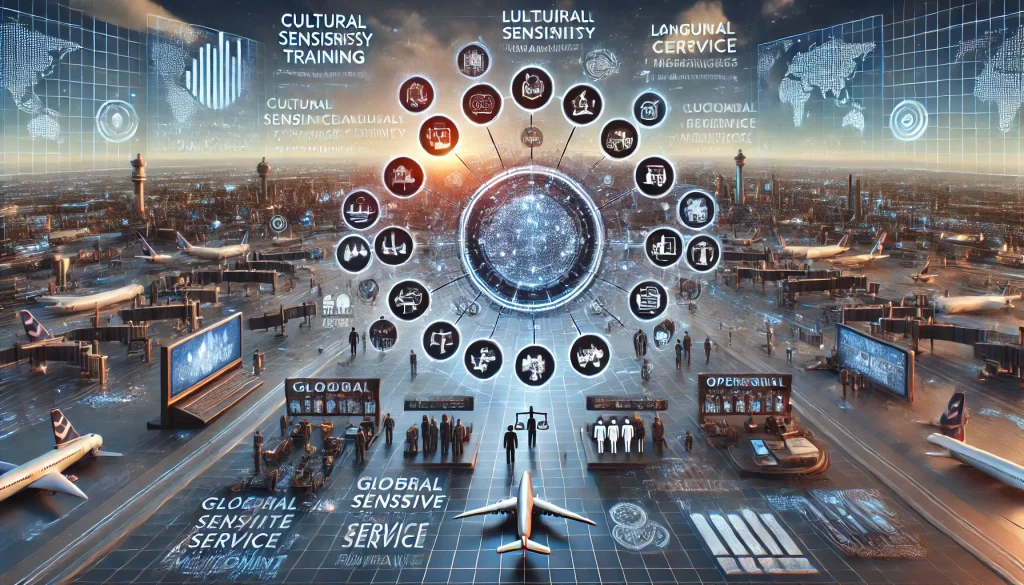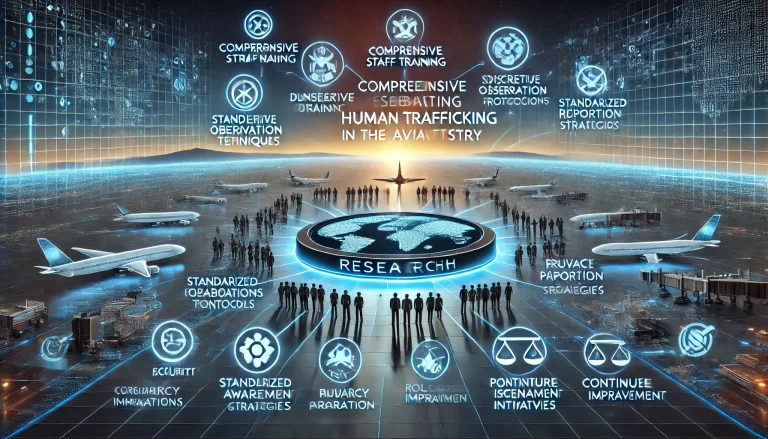Problem Statement
Operating in a global market presents airlines with the challenge of navigating a complex web of cultural norms, languages, and diverse customer expectations. With passengers from a wide range of backgrounds, airlines must ensure that their services, communication, and interactions are culturally sensitive and respectful. Failure to do so can lead to negative customer experiences, misunderstandings, and even damage to the airline’s brand reputation.
Cultural sensitivity is particularly important in the airline industry, where interactions with passengers occur at multiple touchpoints, including ticketing, check-in, in-flight service, and customer support. Missteps, such as inappropriate greetings, misunderstandings due to language barriers, or the failure to accommodate cultural dietary restrictions, can lead to dissatisfaction and complaints. Moreover, cultural insensitivity can alienate customers and lead to a loss of business, especially in regions where cultural norms are deeply ingrained and highly valued.
For global airlines, ensuring that all staff are trained in cultural awareness and that services are tailored to meet the diverse needs of passengers is essential but challenging. This requires a comprehensive approach that includes cultural sensitivity training for staff, the development of multilingual communication materials, and the customization of in-flight services to cater to different cultural preferences. Additionally, airlines must be mindful of the cultural implications of their marketing and branding efforts, ensuring that they resonate with, rather than offend, their target audiences.
The challenge is further compounded by the need to maintain consistency in service quality across different regions while adapting to local cultural norms. Airlines must strike a balance between providing a standardized global service and allowing for regional customization to meet the unique needs of their diverse customer base.
Addressing these challenges requires a deep understanding of cultural diversity and a commitment to continuous learning and adaptation. By prioritizing cultural awareness and tailoring services to meet the needs of all passengers, airlines can enhance customer satisfaction, build brand loyalty, and thrive in a competitive global market.
Pain Points
- Cultural Misunderstandings: Risk of negative customer experiences due to a lack of cultural sensitivity or awareness.
- Language Barriers: Challenges in communicating effectively with passengers who speak different languages.
- Diverse Customer Expectations: Difficulty in meeting the varied needs and preferences of a global customer base.
- Inconsistent Service Quality: Balancing the need for global consistency with regional customization.
- Cultural Sensitivity Training: Ensuring that all staff are adequately trained in cultural awareness and sensitivity.
- Brand Reputation Risk: Potential damage to the airline’s brand if cultural missteps lead to public complaints or negative media coverage.
- Dietary and Religious Needs: Challenges in accommodating cultural dietary restrictions and religious practices.
- Marketing and Branding: Risk of cultural insensitivity in marketing campaigns that do not resonate with diverse audiences.
- Customer Feedback Management: Addressing and learning from culturally related customer complaints and feedback.
- Operational Complexity: The logistical challenges of implementing culturally sensitive practices across multiple regions and languages.

Future Vision
Our platform envisions a future where global airlines excel in cultural awareness, offering personalized services that cater to the diverse needs of passengers from around the world. To achieve this, the platform will support the development and implementation of comprehensive cultural sensitivity training programs for all airline staff, ensuring they are equipped to interact respectfully and effectively with passengers from different cultural backgrounds.
The platform will also advocate for the creation of multilingual communication materials, including announcements, in-flight entertainment options, and customer support services, to bridge language barriers and enhance the passenger experience. Airlines will be encouraged to offer a range of culturally appropriate services, such as customized meal options that cater to dietary restrictions and religious practices, and in-flight amenities that respect cultural norms.
To maintain consistency in service quality while allowing for regional customization, the platform will promote the use of localized service protocols that align with the cultural expectations of different regions. This approach will help airlines balance the need for a standardized global brand with the flexibility to adapt to local preferences.
In addition to operational practices, the platform will emphasize the importance of culturally sensitive marketing and branding efforts. Airlines will be encouraged to conduct cultural audits of their marketing campaigns to ensure that they resonate with diverse audiences and avoid cultural missteps.
Customer feedback will play a crucial role in continuously improving cultural sensitivity. The platform will support the development of feedback mechanisms that allow passengers to share their experiences and offer suggestions for improvement. By analyzing this feedback, airlines can identify areas where they need to enhance their cultural awareness and tailor their services accordingly.
Through these initiatives, our platform aims to help global airlines build a reputation for cultural sensitivity, enhance customer satisfaction, and foster brand loyalty across diverse markets. By prioritizing cultural awareness and adaptability, airlines can thrive in an increasingly interconnected and multicultural world.
Use Cases
- Cultural Sensitivity Training Programs: Implementing comprehensive training for all staff to ensure respectful and effective interactions with passengers from diverse cultural backgrounds.
- Multilingual Communication Materials: Developing announcements, in-flight entertainment, and customer support services in multiple languages to bridge language barriers.
- Customized In-Flight Services: Offering meal options, amenities, and services tailored to cultural dietary restrictions and religious practices.
- Localized Service Protocols: Creating service protocols that align with regional cultural norms while maintaining global brand consistency.
- Culturally Sensitive Marketing: Conducting cultural audits of marketing campaigns to ensure they resonate with diverse audiences.
- Feedback Mechanisms: Developing systems that allow passengers to share culturally related feedback and suggestions for service improvement.
- Brand Reputation Management: Monitoring and addressing cultural missteps to protect and enhance the airline’s brand reputation.
- Customer Experience Personalization: Leveraging data to personalize the passenger experience based on cultural preferences and expectations.
- Cultural Awareness in Crisis Management: Ensuring that cultural sensitivity is maintained during crisis communication and management.
- Global-Regional Balance: Developing strategies to balance global service consistency with the need for regional customization.
Target Users and Stakeholders
- User: Airline Customer Service Teams, Marketing Teams, Training Managers, and Operations Teams
- Age Group: 25-60 years
- Gender: M/F
- Usage Pattern: Regular usage for developing culturally sensitive practices, enhancing customer experience, and managing global operations
- Benefit: Improved customer satisfaction, enhanced brand reputation, and increased operational efficiency
- Stakeholders:
- Airlines: Companies seeking to enhance their global operations through cultural awareness and sensitivity.
- Passengers: Individuals who expect culturally respectful and personalized services during their travel experience.
- Training Providers: Companies offering cultural sensitivity training programs and resources for airline staff.
- Marketing and Branding Teams: Professionals responsible for ensuring that marketing campaigns resonate with diverse audiences.
- Customer Feedback Teams: Teams that collect and analyze passenger feedback to improve service quality and cultural sensitivity.
Key Competition
- Delta Air Lines: Known for its commitment to cultural sensitivity and personalized passenger experiences, particularly on international routes.
- Singapore Airlines: Offers culturally tailored services, including multilingual communication and customized meal options.
- Emirates: Emphasizes cultural awareness in its in-flight service, catering to passengers from diverse backgrounds.
- Qatar Airways: Provides personalized services that respect cultural norms, including dietary and religious accommodations.
- Cathay Pacific: Focuses on delivering culturally sensitive services, particularly in the Asia-Pacific region, where it operates.
Products/Services
- Delta Air Lines Cultural Sensitivity Programs: Training staff to ensure respectful and effective interactions with passengers from diverse cultural backgrounds.
- Singapore Airlines Multilingual Communication: Offering announcements and in-flight entertainment in multiple languages to enhance the passenger experience.
- Emirates Customized In-Flight Services: Providing meal options and amenities tailored to cultural dietary restrictions and religious practices.
- Qatar Airways Localized Service Protocols: Developing service protocols that align with regional cultural norms while maintaining global brand consistency.
- Cathay Pacific Culturally Sensitive Marketing: Conducting cultural audits of marketing campaigns to ensure they resonate with diverse audiences.
Active Startups
- CultureWizard: Provides online cultural awareness training programs for global teams, including airlines.
- Globig: Offers resources and tools for navigating cultural differences in global business operations, including travel.
- Cultural Intelligence Center: Specializes in assessing and developing cultural intelligence (CQ) in organizations, including airlines.
- Rosetta Stone: Develops language learning software that helps airline staff communicate effectively with passengers in multiple languages.
- Kwintessential: Provides cultural sensitivity training and translation services for global businesses, including airlines.
- LanguageLine Solutions: Offers interpretation and translation services to bridge language barriers in customer interactions.
- Global LT: Provides cultural training and language services to enhance cross-cultural communication in global organizations.
- CultureAmp: Focuses on employee engagement and feedback platforms that include cultural awareness and sensitivity training.
- WorldAware: Offers risk management solutions that include cultural awareness training for global travelers and organizations.
- Learnlight: Provides language and cultural training programs tailored to the needs of global companies, including airlines.
Ongoing Work in Related Areas
- Cultural Sensitivity Research: Exploring new approaches to enhancing cultural awareness in global airline operations.
- Multilingual Communication Tools: Developing advanced tools and platforms for multilingual communication in the airline industry.
- Personalization Technologies: Leveraging AI and data analytics to personalize the passenger experience based on cultural preferences.
- Global-Regional Service Balance: Researching best practices for balancing global service consistency with regional customization.
- Cultural Awareness in Marketing: Innovating in culturally sensitive marketing strategies that resonate with diverse audiences.
Recent Investment
- CultureWizard: $5M in Series A funding led by private investors, September 2019.
- Globig: $2.5M in Seed funding led by angel investors, June 2018.
- Cultural Intelligence Center: $3M in Series A funding led by impact investors, January 2020.
- Rosetta Stone: $25M in Series C funding led by In-Q-Tel, March 2021.
- Kwintessential: $1.5M in Seed funding led by private investors, October 2019.
Market Maturity
The market for cultural sensitivity and awareness in the airline industry is maturing rapidly, driven by the increasing importance of providing personalized and culturally respectful services in a globalized world. Airlines like Delta, Singapore Airlines, and Emirates are leading the way with comprehensive cultural sensitivity programs, multilingual communication, and customized in-flight services. Startups like CultureWizard, Globig, and the Cultural Intelligence Center are innovating with online training platforms and resources that help airlines enhance their cultural awareness and improve the passenger experience. Significant investments in cultural sensitivity research, multilingual communication tools, and personalization technologies are transforming the airline industry, enabling airlines to navigate cultural diversity effectively and build strong brand reputations. As the market continues to evolve, we expect to see more integrated and culturally aware service offerings that cater to the diverse needs of passengers around the world.
Summary
Airlines operating globally must navigate a complex web of cultural norms, languages, and customer expectations. Missteps in cultural sensitivity can lead to negative customer experiences and damage to the brand. Ensuring that all staff are trained in cultural awareness and that services are tailored to diverse customer needs is essential but challenging for global airlines. Our proposed platform leverages cultural sensitivity training programs, multilingual communication materials, customized in-flight services, localized service protocols, and culturally sensitive marketing efforts to address these challenges. Key pain points include cultural misunderstandings, language barriers, diverse customer expectations, inconsistent service quality, cultural sensitivity training, brand reputation risk, dietary and religious needs, marketing and branding challenges, customer feedback management, and operational complexity.
Target users include airline customer service teams, marketing teams, training managers, and operations teams, with stakeholders encompassing airlines, passengers, training providers, marketing and branding teams, and customer feedback teams. Key competitors like Delta Air Lines, Singapore Airlines, Emirates, Qatar Airways, and Cathay Pacific offer various culturally tailored services and training programs, while startups such as CultureWizard, Globig, and the Cultural Intelligence Center are driving innovation in cultural awareness and sensitivity training. Recent investments highlight significant interest and growth potential in platforms addressing cultural sensitivity and awareness in the airline industry.
By addressing these challenges and leveraging advanced technologies and training programs, our platform aims to help global airlines enhance customer satisfaction, build brand loyalty, and thrive in a competitive global market by prioritizing cultural awareness and adaptability.



